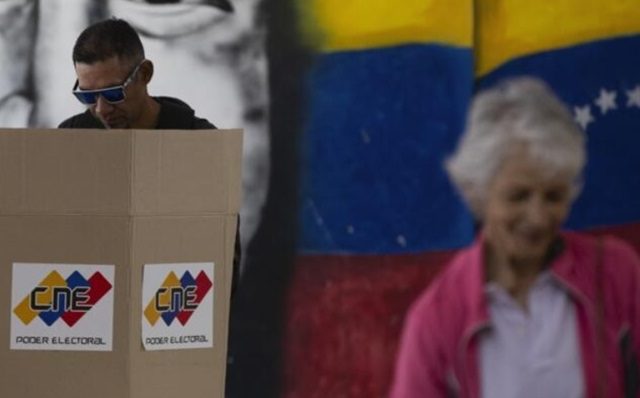BTN News: Nicolás Maduro’s speech, which began with promises of change and transformation after 25 years of revolution, has now turned into direct threats to the country’s stability if he loses the election. “If you don’t want Venezuela to fall into a bloodbath, into a fratricidal civil war caused by fascists, let’s guarantee the greatest success and the greatest victory in our electoral history,” said the Venezuelan president on July 17 during a rally in La Vega, a popular area in the west of the capital.
Arbitrary Arrests and Opposition Crackdown
The Venezuelan NGO Foro Penal reports 124 arbitrary detentions this year, with 102 linked to the opposition’s campaign team. Since the formal start of the campaign on July 4, 77 people have been detained. Six of María Corina Machado’s closest associates, including her right-hand and campaign manager Magalli Meda, are seeking refuge in the Argentine embassy due to persecution. Although 69 of the 124 detainees have been released, the NGO fears the number will continue to rise.
Government Allegations and Arrests
The government has also reported multiple conspiracies against President Maduro. Recently, businessman Ricardo Albacete, 72, was arrested for an alleged plan to sabotage the electrical system. A week before his arrest, Albacete had hosted María Corina Machado at his residence in Táchira state. These accusations have been dismissed by his lawyer, who claims no communication with his client has been allowed.
Uncertainty Surrounding the July 28 Election
According to political scientist Luis Salamanca, the unpredictability of this election is due to the real risk to the Chavismo movement’s hold on power. “It’s the first time in 25 years that the presidency is at stake. If they lose, they lose the core of their power. This is unprecedented and makes the behavior of the actors involved and what might happen in Venezuela unpredictable,” Salamanca told France 24.
With less than 10 days to the election, uncertainty looms large. The deadline for candidate substitution on the ballot passed at midnight on July 18, and the opposition is concerned about the possible disqualification of the MUD’s card (the coalition backing Edmundo González) before the election.
Polls and Predictions: A Tense Electoral Landscape
Luis Vicente León, president of Datanálisis, notes that Venezuela has never approached an election with so many open scenarios. “It’s been an atypical campaign. The campaign is not led by the opposition candidate but by a leader who has been disqualified yet has immense popular support,” León said.
Polls from Datanálisis, Delphos, Consultores 21, and ORC Consultores show Edmundo González Urrutia leading by more than 20% over President Maduro. However, the official government pollster, Hinterlaces, predicts a Maduro victory with 54.2%.
The Battle of the Polls Reflects Tension
Félix Seijas of Delphos presented a poll showing González leading by 20-34%, depending on voter turnout. González has a 59.1% voting intention, compared to Maduro’s 24.6%. Saul Cabrera of Consultores 21 believes the opposition will win unless the Supreme Court disqualifies the MUD or suspends González’s candidacy. “If conditions remain as they are, there’s no chance the opposition will lose,” Cabrera told France 24.
Hinterlaces, however, predicts a strong win for Maduro, with a poll showing 56.7% of votes for the ruling party versus 23.2% for the opposition. This survey’s credibility has been questioned by the opposition, who accuse the firm of favoring Chavismo.
Questionable New Pollsters
The media coalition ‘C-Informa’ published an investigation revealing six newly established pollsters of dubious credibility promoting Maduro as the favorite. One such firm, Data Viva, claimed Maduro had 55.2% support against González’s 20.9%.
Other Candidates and Voter Participation
Eight other candidates will appear on the ballot, allegedly to divide the opposition vote. Consultores 21 estimates these candidates will garner less than 5% of the vote. Most pollsters predict voter turnout between 65% and 75%. Félix Seijas notes a 20% abstention rate due to emigration and obstacles set by the CNE for Venezuelans abroad.
Regional Impact of Election Results
The election results will significantly impact the region, particularly regarding migration. According to ORC Consultores’ Oswaldo Ramírez, 18% of Venezuelans plan to leave the country if their preferred candidate does not win.
Maduro’s Claims and Election Integrity
Maduro, confident of victory, accused the opposition of planning to reject the election results. His campaign manager, Jorge Rodríguez, claimed international media were part of this strategy and vowed to defend the election results “with our own lives.”
During a rally in Falcón state, Maduro attacked major news agencies covering the election: “They plan to cry fraud, tarnish the electoral process, and lead the charge with CNN, EFE, AFP, and AP,” he said, accusing them of trying to discredit Venezuela.
Future Negotiations Post-Election
Despite the uncertainty, analysts agree that regardless of the outcome, there will likely be a period of negotiation between July 29 and January 10, the inauguration date for the new government, to ensure governability in the country.


